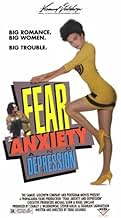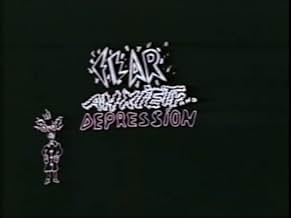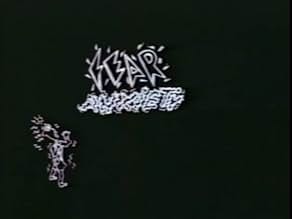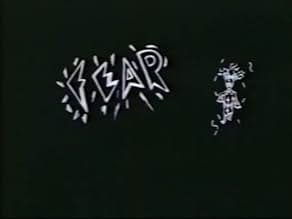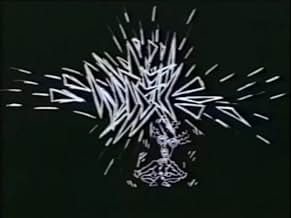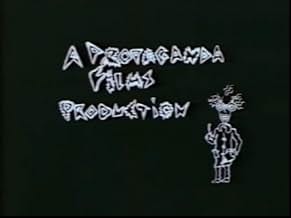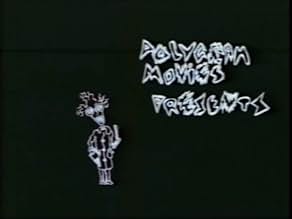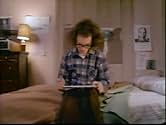A young, tentative playwright can't puzzle out his muse, let alone his whole life.A young, tentative playwright can't puzzle out his muse, let alone his whole life.A young, tentative playwright can't puzzle out his muse, let alone his whole life.
Anne DeSalvo
- Sylvia
- (as Anne De Salvo)
August Costa
- Eric
- (uncredited)
- Director
- Writer
- All cast & crew
- Production, box office & more at IMDbPro
Featured reviews
I presume the schlockiness is intentional. It is very well-executed schlockiness. The archetypes are conventionally but very truthfully drawn: clinging desperate girlfriend, dangerous girlfriend, "best friend's girl" girlfriend, the commercially successful classmate from your old high school, the using "best friend".
The style of the movie is bizarre. The New York pictures are well-chosen for the flavor of the movie. The music often clashes with the action or the visual dynamic in a way that seems deliberate. It doesn't result in the Knowing Guffaw, or the Delighted Titter, but it just seems to lay the scene out stiff, like the way you feel when you're out for dinner with your parents at a place you now know is beneath you and your aspirations (a scenario which recurs at comforting intervals during the picture) -- this is a fine depiction of "spinning your wheels" during your inept and misguided 20s. I don't know a lot about this writer/director and his work (I live in a cinematically-challenged area) but if he meant it the way it came out, he's really reaching me.
There are "musical interludes" so artfully awkward. The "Ay-yi-yi-ra" song is a special treat. The movie is cloyingly awkward, but the result is so off-beat, so "am I really seeing this?" that I couldn't stop watching. I would really like everyone I know to see the "performance artist girlfriend" 'cause I'm amazed at her make-up technique, and her hair-doos.
Too bad the credits for this movie on this site are so sparse.
The style of the movie is bizarre. The New York pictures are well-chosen for the flavor of the movie. The music often clashes with the action or the visual dynamic in a way that seems deliberate. It doesn't result in the Knowing Guffaw, or the Delighted Titter, but it just seems to lay the scene out stiff, like the way you feel when you're out for dinner with your parents at a place you now know is beneath you and your aspirations (a scenario which recurs at comforting intervals during the picture) -- this is a fine depiction of "spinning your wheels" during your inept and misguided 20s. I don't know a lot about this writer/director and his work (I live in a cinematically-challenged area) but if he meant it the way it came out, he's really reaching me.
There are "musical interludes" so artfully awkward. The "Ay-yi-yi-ra" song is a special treat. The movie is cloyingly awkward, but the result is so off-beat, so "am I really seeing this?" that I couldn't stop watching. I would really like everyone I know to see the "performance artist girlfriend" 'cause I'm amazed at her make-up technique, and her hair-doos.
Too bad the credits for this movie on this site are so sparse.
I am a big fan of both WELCOME TO THE DOLLHOUSE and HAPPINESS, and didn't even know this movie existed until it was shown recently on the "Romance Classics" cable channel, of all places. (The only "star" acknowledged in the channel listing was Stanley Tucci, who does have a small supporting role.) This film tries too hard to be a wacky look at love for a loser (played by Solondz), and I found its wackiness to be both forced and intrusive. While it does contain some of the elements that are used so much more effectively in his later two films, such as an unblinking look at the ugliness in life, and strange songs with lyrics penned by Solondz, this film is not in the same league as either. It doesn't help that intentionally or otherwise, Solondz comes off as a annoying version of Woody Allen. Recommended for Solondz (or Tucci) completists only.
In our present era, where love is a greedy algorithm (those who already have the most are the only ones who ever get more), Solondz is the best spokesman for the socially oppressed. His movies consistently make me laugh, unlike the usual "popular" Hollywood drivel. I can only hope that he doesn't sell out at least in the near future, as I'm convinced he's the next big thing. (I'm thinking what happened to Susan Seidelman and Amy Heckerling.) I noticed the little things in FAD: camera shots like something out of Godard, artistic spoofs of Magritte, Junk's Frankenstein's bride hair, Janis wearing a cheerleader jacket and eating ice cream, and the blinds that say "Always" and "Late". There is an attention to details overwhelming the flaws and showing the talent. The reality of winning and losing at love may not be changed by Solondz in our era. But he will show us its truth, and that can at least bring us hope.
Dismiss the fact that, in the starring role and as author of the script, Solondz comes off as a Gen-X version of Woody Allen, get past that already-been-done persona and you'll find a fun little film here. Though the film centers on Solondz' character, to his credit as scriptwriter, he endows his supporting characters with fully developed and multivaried personalities and situations. This provides opportunity for the supporting actors to turn-in some terrific performances, most especially Jill Wisoff as Ira's (Solondz') insistent girlfriend Sharon (Oscar-Nom worthy, if you ask me). Some excellent compositions in the cinematography, some of the most eccentric locations you'll find in New York, and a downright infectious end-title song ("Neat Kind of Guy") make this a sure-bet for your video-renting pleasure. Not the best film, but it'll surely not be checked out from your video store and you'll definitely enjoy a few laughs.
While everyone seems to be pretending that writer/director Todd Solondz made his debut with "Welcome to the Dollhouse," his first effort was actually this comic look at NYC's underground art scene. (In his defense, Solondz did not have final cut, and he was not pleased with the results, so he has at least some justifiable motivation for trying to re-write history -- this film is not listed in his bio in the "Happiness" press kit, and I suspect many critics don't know it exists.)
So, how is it? Uneven, yes, but possessed of a biting wit (nowhere near as trenchant as it would get in Solondz's later, better films). Solondz also stars in the film, cutting an unusual but nonetheless memorable figure as Ira, an unsuccessful playwright who keeps hoping that Samuel Beckett will reply to his invitation for a collaboration.
"Fear, Anxiety and Depression" isn't for everyone, but if you find the title appealing, its sense of humor may tickle you as well. The Samuel Goldwyn Company (barely) released the film in 89/90, and you can still find it on video. Warning: Solondz's bizarre and funny love song "A Neat Kind of Guy" will get stuck in your head for DECADES.
So, how is it? Uneven, yes, but possessed of a biting wit (nowhere near as trenchant as it would get in Solondz's later, better films). Solondz also stars in the film, cutting an unusual but nonetheless memorable figure as Ira, an unsuccessful playwright who keeps hoping that Samuel Beckett will reply to his invitation for a collaboration.
"Fear, Anxiety and Depression" isn't for everyone, but if you find the title appealing, its sense of humor may tickle you as well. The Samuel Goldwyn Company (barely) released the film in 89/90, and you can still find it on video. Warning: Solondz's bizarre and funny love song "A Neat Kind of Guy" will get stuck in your head for DECADES.
Did you know
- TriviaFirst feature film directed by Todd Solondz.
- ConnectionsReferences Hôtel international (1963)
- How long is Fear Anxiety and Depression?Powered by Alexa
Details
Box office
- Gross US & Canada
- $47,148
- Opening weekend US & Canada
- $4,212
- Dec 10, 1989
- Gross worldwide
- $47,148
Contribute to this page
Suggest an edit or add missing content

